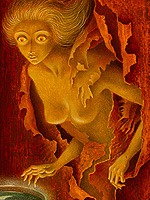Enna
Aucun rang assigné

Type : ENFP - 5
Age : 31
Lieu : Paname
Emploi : Cafetière
Inscription : 14/10/2014
Messages : 55
 |  (#) Sujet: The Big 5 Model (#) Sujet: The Big 5 Model  Lun 17 Nov 2014, 11:35 Lun 17 Nov 2014, 11:35 | |
| En cours on étudie les test de personnalité, notre prof nous a parlé du MBTI puis il a introduit un modèle que je ne connaissais pas, le Big Five Model.
http://psychcentral.com/blog/archives/2009/11/10/the-big-5-model-of-personality/
http://fr.wikipedia.org/wiki/Big_Five_(psychologie)
En gros c'est un modèle qui me parait assez empirique et je me pose pas mal de questions sur son aspect.... scientifique ou concret, du coup je voulais avoir vos avis, surtout si des personnes connaissent le modèle (qui est la plupart du temps utilisé dans les entreprises)
Il se base sur 5 dimensions:
- "extraversion" (si on est sociable, actif, bavard...)
- "neuroticism" (insécurité, anxiété, sentiments négatifs)
- "conscentiousness" (responsabilité, persévérance, capacité à travailler)
- "agreeableness" (fidélité, flexibilité, tolérance)
- "openess to experience" (curiosité, intelligence, imagination)
En gros les 5 dimensions sont évaluées sur une échelle entre pas du tout et beaucoup, et cela permet de prendre des décisions de management (embauche, groupe etc.)
|
|
Lauterwasser
Aucun rang assigné

Type : XNFP, type 7 / chaotic-good
Age : 40
Lieu : Montpellier
Emploi : Musicothérapeute Winnicottien, gestaltste et phénoménologiste
Inscription : 07/09/2013
Messages : 1798
 |  (#) Sujet: Re: The Big 5 Model (#) Sujet: Re: The Big 5 Model  Lun 17 Nov 2014, 12:51 Lun 17 Nov 2014, 12:51 | |
| Extraversion 23
Agreeableness 42
Conscientiousness 21
Neuroticism 25
Openness 47
The personality test that you've just taken is based on the Five Factor Model of personality. Personality psychologists believe this is a pretty good description of the broad traits or general areas that go to make up a person's core personality. Personality isn't set in stone, however, so keep that in mind if you see anything you'd like to alter below. Teenagers and young adults should take the below results with a bit of caution, as their personalities are still under development (personality is generally pretty well formed by one's mid 20's).
What do each of the 5 traits mean?
Extraversion - Energy, enthusiasm, socialable
Agreeableness - Altruism, helping others, affection, friendliness
Conscientiousness - Control, will, constraint, dependability
Neuroticism - Negative emotions, nervousness
Openness to Experience - Originality, culture, open-minded, intellect
Extraversion
Extraversion This trait reflects a person's preference for certain kinds of social situations, and how they like to behave in such situations. People high in extraversion are energetic and seek out the company of others. People low in extraversion -- what some might call introverts -- tend to be more quiet and reserved.
You scored average for this trait, suggesting you lead a balanced life between extraversion and introversion.
Agreeableness
Altruism This trait reflects how we tend to interact with others, especially in terms of our altrusim and friendliness. People who score higher in agreeableness tend to be more trusting, friendly and cooperative than others. People who score lower tend to be more aggressive and less cooperative.
Attention! You scored really high on this trait, suggesting you are a very friendly, cooperative and trusting person.
Conscientiousness
Well organized This trait reflects how organized and persistent a person is in pursuing their goals. People who score high on this trait tend to be more methodical, well-organized and dutiful than others. People who score lower tend to be less careful, less focused and more likely to be distracted from tasks.
You scored average for this trait, suggesting you're somewhere between being well-organized and sometimes distracted.
Neuroticism
Stressed This trait reflects the tendency for a person to experience negative thoughts and feelings. People who score high on this trait tend to be more prone to insecurity and emotional distress. People who score lower tend to be more relaxed, less emotional and less prone to distress.
You scored average for this trait, suggesting you've struck a balance between expressing negative emotions and being relaxed.
Openness to Experience
Artist This trait reflects a person's open-mindedness, and interest in culture and art. People who score high on this trait tend to be imaginative, creative, and to seek out cultural and educational experiences. People who score lower on this trait tend to be more down-to-earth, less interested in art and more practical in nature.
Attention! You scored really high on this trait, suggesting you love art and try to keep open-minded.
Recommendations
Attention! You have 2 significant personality traits that we've identified.
If the traits are hurting your life, you may consider seeking out further assistance for them, by consulting a psychologist or other mental health professional.
Please remember, this is not an official diagnostic test. It is only a general quiz to give you a broad understanding of common personality factors.
|
|
